Peacebuilders on the other side of the world
There are currently more than 150 Swiss experts working to promote peace around the globe. This includes 15 police officers taking part in international missions in countries facing precarious security situations or undergoing reconstruction. At present, they are on mission in Mali, the Democratic Republic of the Congo (DRC) and Somalia.
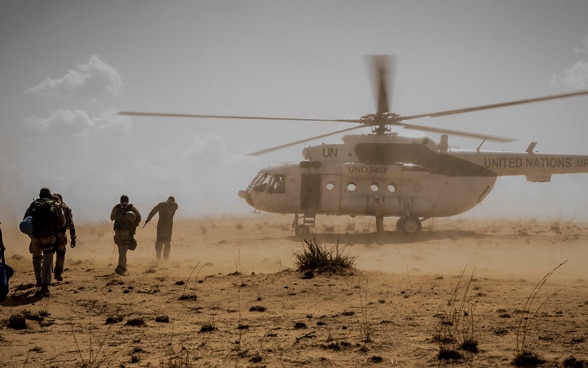
Fact-finding mission in central Mali. © MINUSMA/Harandane Dicko
Jennifer, Raphael, Michel, Angela, Yvana, Leila, Laurent and Claudio are all police officers who have chosen to temporarily don another uniform and apply their skills abroad. They were picked by the Federal Department of Foreign Affairs (FDFA) and are now members of the Swiss Expert Pool for Civilian Peacebuilding. Most of them are on provisional secondment from their different units and have been deployed as police experts to the UN's missions in Mali (MINUSMA), Somalia (UNSOM) and the DRC (MONUSCO).
In the field they are known as peacebuilders, wearing the UN's signature blue helmet or beret whilst on mission.
What do they do every day?
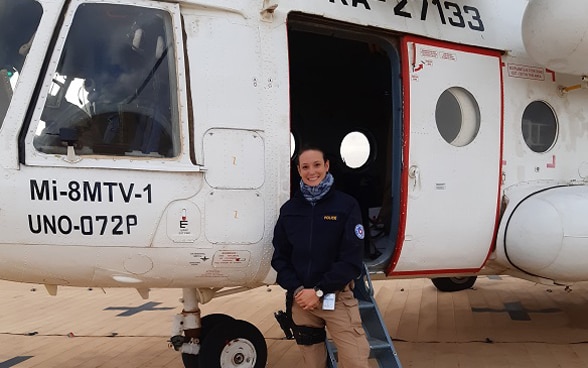
They are there to serve and protect people. Even on the other side of the world, their work is about everyday action. They support local governments and transfer skills to national police forces with the sole aim of fostering peace and international security, a common mission for all.
Actual responsibilities vary depending on the specific assignment – training courses for local police to build capacities, carrying out investigations, preventing and recording crimes, protecting people and property by their presence in the community, while maintaining respect for internationally recognised human rights.
"My name is Jennifer. I'm 33 and work for the police in Vaud. This is my first UN mission – I've been deployed to Bamako in Mali with MINUSMA. I'm working in the internal investigations unit of MINUSMA's police component. We investigate anything to do with the UN's police officers – cases of misconduct, their involvement in attacks or incidents, also as potential victims."
Contributing to peace and international security
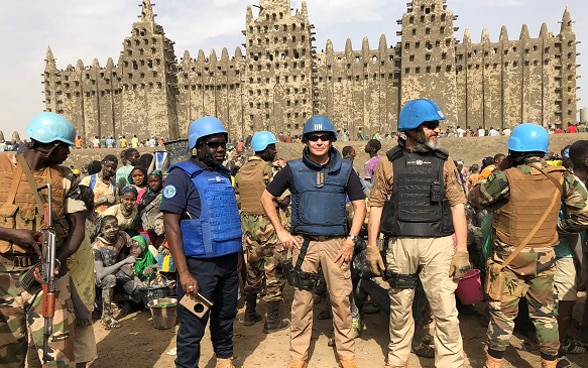
The UN does not have its own police force. Its peacekeeping operations are made up of police officers from UN member states, including Switzerland. Around 9,000 experts take part in these international peacekeeping operations every day. Switzerland seconds around 15 officers each year.
The UN's peacekeeping operations help conflict-ridden countries create the necessary conditions for a return to lasting peace. At present, there are missions in Africa, the Middle East, Central Asia and Eastern Europe.
"My name is Laurent. I've been on five international missions, including four for the UN. I've spent seven of the last ten years in Africa – in Côte d'Ivoire, the DRC, Congo and Mali. Now I'm back in the DRC again, working as head of the eastern sector. I'm in charge of around fifty experts from all over the world as well as a security company that escorts us when we're on patrol."
A plus for Switzerland
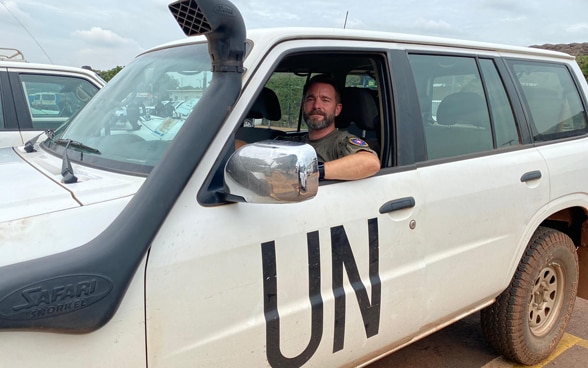
Multilateral peacekeeping operations are powerful tools in the peaceful resolution of conflicts around the world. Peace support is enshrined in Switzerland's Federal Constitution and is one of its priority lines of action when it comes to foreign policy. Switzerland is running for a seat on the Security Council for 2023–24 under the slogan 'A Plus For Peace'. Fostering peace and international security also depends on the safeguarding of Switzerland's interests, independence, security and prosperity.
"My name is Michel. I'm 47 and this is my first international mission. I've been deployed to Mali to take part in MINUSMA. In Switzerland I work as an inspector in Lausanne's criminal investigation division. Working to foster peace beyond our borders, in countries that are in crisis, also helps maintain peace at home within our borders."
Why do they do it?
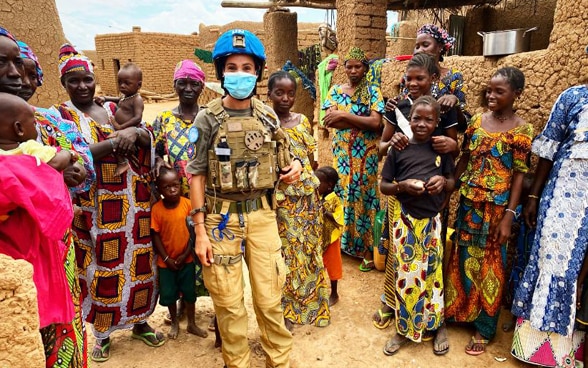
In the field, situations are often tense and the day-to-day work not always easy. Swiss peacebuilders are picked for their extensive experience and individual skills.
The Swiss Expert Pool for Civilian Peacebuilding is currently looking for new recruits.
"My name is Yvana. I'm 38 and this is my first mission – MINUSMA. The main reason I joined the expert pool was so that I could share my professional skills with local police and other partners in the field, and work with men and women from different countries and cultures."
Women and men in the field
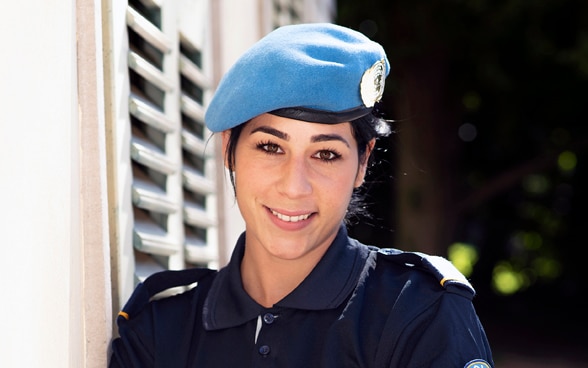
When it comes to Swiss police officers on international missions, there are almost as many women as men. The women in blue helmets take on the same role as the men and, in some cases, make peacekeeping operations even more effective.
Leila, 34 years old, has currently been deployed to MINUSMA. She works for the Police Régionale des Villes du Centre (Sion/Sierre): "Sharing our professional expertise and driving force to support and train the local police clearly provides added value. And women can definitely offer a different approach to certain situations on the ground."
A reputation for expertise, and added value back home
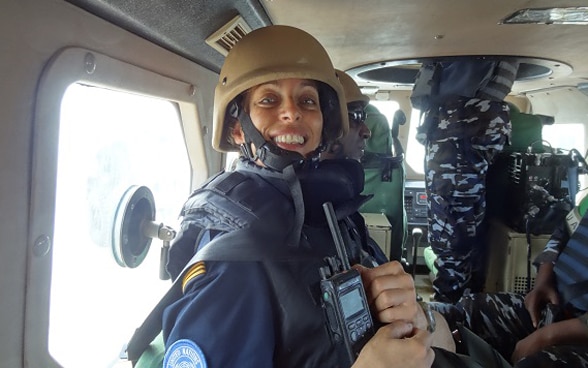
Switzerland is highly regarded in particular for its federalism, neutrality and expertise. This is especially true in Somalia, for example, where police decentralisation is a key issue.
Back home, the opinion is unanimous. It isn't just the unique experience of living in a context so completely different to Switzerland. These police officers have also acquired valuable social skills – respect for diversity and different cultures, open-mindedness and tolerance, adaptability, a focus on innovative approaches, work management in multi-ethnic teams – that will be an asset to national security when they return to their units in Switzerland.
Angela, 52 years old: "I've been working as a police adviser to UNSOM since June 2019. Before that I worked at the missions in Georgia and Kosovo. In my view, fundamental Swiss values like integrity, professionalism and respect for diversity, as well as democracy and multilingualism, are the ideal basics for peacekeeping."
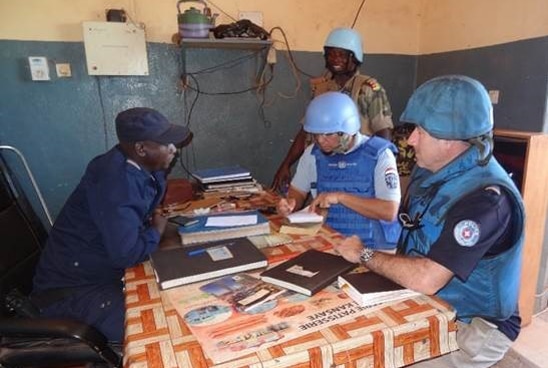
"My name is Claudio and I'm 55. The DRC is my second mission for the UN where I've been deployed to the Mission Support Centre (MSC) in Goma as liaison officer. My professional background is in the military police and border guards. Swiss officers have got a lot to offer the United Nations. We've all been trained in line with the best standards and working principles, and I can definitely say that we set an example for all UNPOL officers working in the UN's missions."
Swiss Expert Pool for Civilian Peacebuilding
- Set up in 2000
- Instrument of Swiss peace policy
- Around 200 experts deployed each year
- Secondments: mainly with the United Nations (UN), Organization for Security and Co-operation in Europe (OSCE) and European Union (EU).
- Posts: police experts, election observers and thematic specialists
- Locations: head offices of the organisations or in the field
- Goal: contributing to peace and international security
Links
- International Police Missions of Switzerland, FDFA
- Swiss Expert Pool for Civilian Peacebuilding, FDFA
- United Nations Police, UN
- United Nations Multidimensional Integrated Stabilization Mission in Mali (MINUSMA), UN
- United Nations Multidimensional Integrated Stabilization Mission in the DR Congo (MONUSCO), UN
- United Nations Assistance Mission in Somalia (UNSOM), UN
